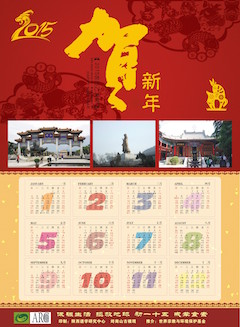| |
|
 |
Calendar reminds Daoists of the importance of fasting
February 3, 2015:
 |
 |
 |
The 2015 fasting calendar |
The Daoist practice of regularly abstaining from eating meat is a long-established tradition that has gained increased significance in the current ecological situation facing China and the rest of the world. As the country has benefitted from increased economic growth so demand for meat has risen, but meeting that demand potentially involves environmental degradation on a massive scale.
it is hoped that reminding Daoists to 'fast' from eating meat for two days a month will encourage restraint on meat eating on other days throughout the year. For the second year running ARC's partner the Taoist Ecological Temple Network has produced an attractive calendar with the fasting days clearly marked. Their explanatory notes (below) show how important this issue is becoming.
New Fasting Calendar for 2015According to Daoist, Buddhist and Chinese folk traditions, people are not supposed to eat meat on the 1st and 15th day of each month based on China’s lunar calendar, as these are “good days” when offerings and sacrifices are made to honour the Gods. With a population of more than 1.3 billion, fasting two days a month is a tradition that can help drastically reduce meat consumption, hence livestock production, which is a leading contributor to a number of environmental problems including global warming, land degradation, air and water pollution, and loss of biodiversity. According to a report by the United Nations Food and Agriculture Organization, livestock production is responsible for 18 percent of greenhouse gas emissions, a bigger share than that of transport.
 |
| The fasting calendar shows how traditional Chinese lunar dates correspond to the modern calendar and thus identifies the two meatless 'Good Days' in every lunar month. |
|
 |
 |
With this fasting tradition in mind, just before the Chinese New Year (Spring Festival) the Taoist Ecological Temples Network started their campaign by distributing a calendar of “Good Days” on which the fasting days are clearly marked. This is important because traditional lunar calendars are different from the modern calendars now used in China and so the days of each month are different. The calendars also had some simple instructions on the benefit of fasting on these two days of every month. The calendars are given away for free in Daoist temples and have proved to be very popular.
According to Prof. Fan Guiching, a famous Daoist scholar from the Sha’anxi Academy of Social Sciences: “This is a classic example of how, simply and extremely effectively, traditions and faiths can help protect the environment by combining incentives for people to change their behaviors. For most people, if good Karma will come simply by giving up meat for two days a week, they’ll do it. Besides, starvation is much lesser of a problem in China than over-eating and unhealthy diet. We saw a population increasingly tormented by obesity, high blood pressure, high cholesterol and cardinal problems. While eating simple vegetarian meals two days a month will not be a solution to these problems, it may help in the long term if people become more accustomed to a simpler diet. To put it simply: it will hardly be a sacrifice, but rather something that brings in positive rewards without the need for much effort. “
It should also be noted that in China, most families still eat together and one vegetarian in a household could affect a whole family’s diet, potentially shaping the younger generation as well, as most children and teenagers rely on their parents to prepare meals for them every day.
Tradition rediscoveredThere is a growing call for rediscovering Chinese traditions and faiths to battle China’s increasing social problems in a vacuum of believes. Last year President Xi's made a statement calling for China's own traditions and faiths to play a larger role in society. This campaign is a classic case of how Chinese traditions and religions could help greatly in such a regard.
The Taoist Ecological Temple Network started this campaign in 2014 across Daoist temples in Xi’an and are continuing it this year while expanding it to other places in China.
For a pdf version of this year’s calendar, please click here.
|
 |
 |
|
|
|
|
|
 |
December 10, 2014:
New chapter in Daoist ecology
“When we first met with Daoists in 1994 there was about 30 people in a freezing cold room inside a dilapidated temple. How great that now it was an amazing presentation in front of a large crowd.” ARC's Martin Palmer talks about the progress made by Daoism in meeting the country's huge environmental challenges. |
 |
November 12, 2014:
Daoism and Christianity - new podcast explores historic links
In a new podcast called ‘The Dao of Jesus’ on the Things Unseen website ARC Deputy Secretary General Alison Hilliard and Secretary General Martin Palmer discuss the ways in which Daoist thought has enabled a different reading of Christian traditions across the centuries and how this has influenced Martin’s own faith. |
 |
September 10, 2014:
Great review for Sacred Mountains in Hong Kong’s South China Morning Post
"Stikker's business-slanted take on ecology and spirituality is intriguing..." says the South China Morning Post. |
 |
 |
|
|

